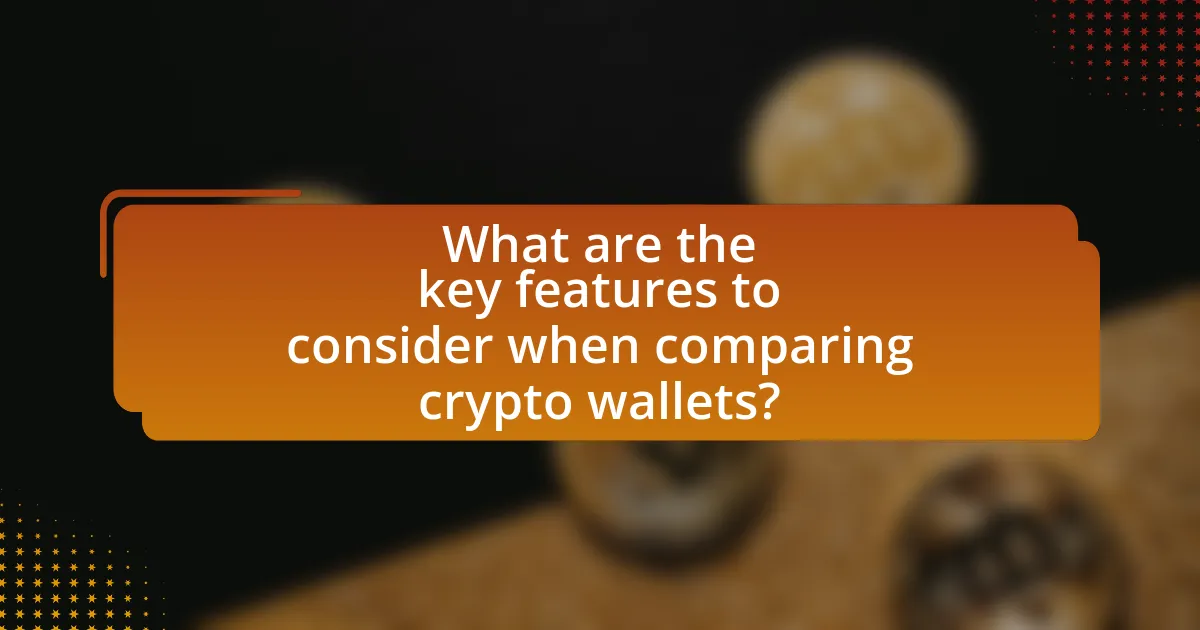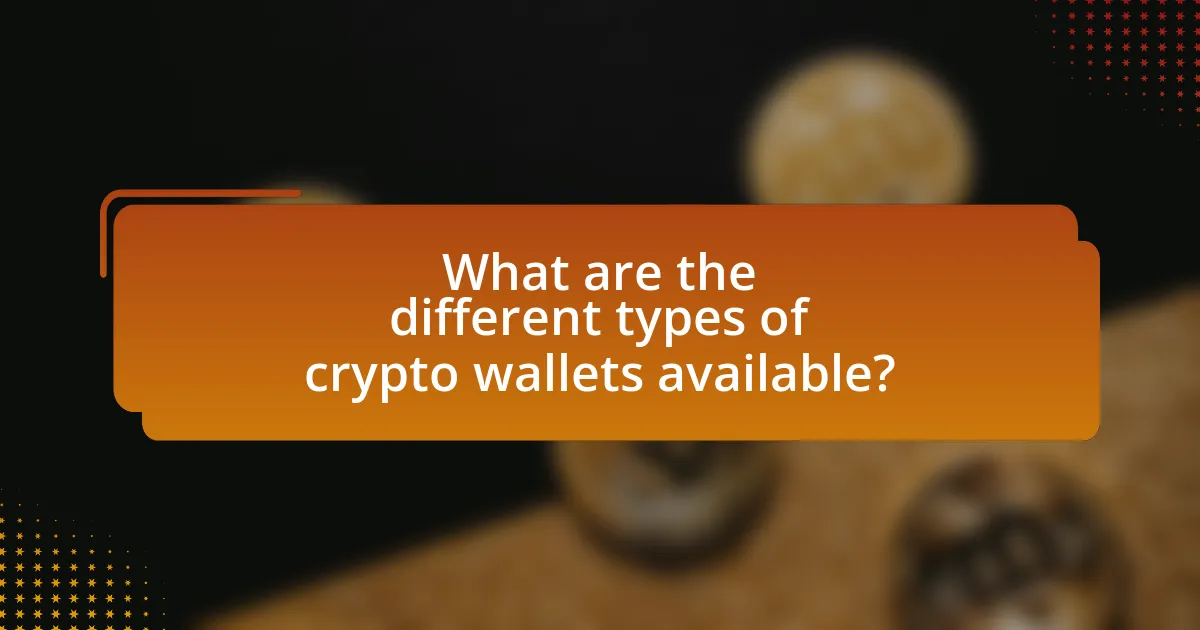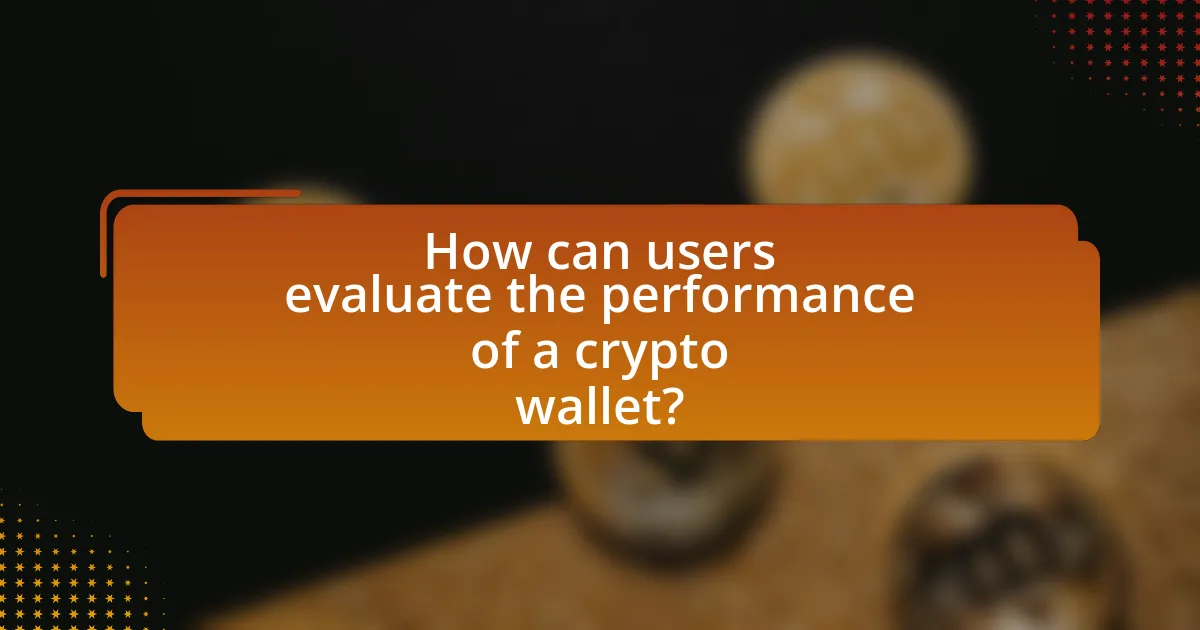The article focuses on comparing key features of crypto wallets, emphasizing aspects such as security, user control, supported cryptocurrencies, ease of use, and backup options. It highlights the importance of security measures like two-factor authentication and encryption, as well as the distinction between custodial and non-custodial wallets. Additionally, the article discusses user experience, wallet compatibility, and the various types of wallets available, including hardware, software, mobile, web, and paper wallets. It provides insights into evaluating wallet performance based on transaction speed, security features, user interface, and fees, while also outlining best practices for selecting a wallet that meets individual needs and securing crypto assets effectively.

What are the key features to consider when comparing crypto wallets?
When comparing crypto wallets, key features to consider include security, user control, supported cryptocurrencies, ease of use, and backup options. Security is paramount; wallets should offer features like two-factor authentication and encryption to protect assets. User control refers to whether the wallet is custodial or non-custodial, with non-custodial wallets allowing users to retain full control over their private keys. Supported cryptocurrencies are crucial, as some wallets cater to specific coins or tokens, impacting versatility. Ease of use affects the user experience, especially for beginners, while backup options ensure that users can recover their funds in case of loss or device failure. These features collectively determine the wallet’s reliability and suitability for individual needs.
How do security features impact the choice of a crypto wallet?
Security features significantly influence the choice of a crypto wallet by determining the level of protection against theft and unauthorized access. Users prioritize wallets that offer robust security measures such as two-factor authentication, encryption, and multi-signature capabilities, as these features reduce the risk of losing funds. For instance, a study by Chainalysis in 2021 revealed that wallets with advanced security protocols experienced 50% fewer hacking incidents compared to those with basic security. Consequently, the presence of strong security features not only enhances user trust but also directly impacts the decision-making process when selecting a crypto wallet.
What types of security measures should a crypto wallet have?
A crypto wallet should have multiple security measures, including two-factor authentication (2FA), encryption, and backup options. Two-factor authentication adds an extra layer of security by requiring a second form of verification, such as a text message or authentication app, in addition to the password. Encryption protects the wallet’s data by converting it into a secure format that can only be accessed with the correct decryption key. Backup options ensure that users can recover their funds in case of device loss or failure, typically through seed phrases or recovery keys. These measures are essential to safeguard against unauthorized access and potential loss of assets.
How do private keys and seed phrases enhance wallet security?
Private keys and seed phrases enhance wallet security by providing unique cryptographic credentials that control access to cryptocurrency assets. Private keys are long strings of alphanumeric characters that allow users to sign transactions and prove ownership of their digital assets, while seed phrases are human-readable representations of these keys, typically consisting of 12 to 24 words. The security of a wallet is significantly increased because possession of the private key or seed phrase is required to access and manage the funds; without them, unauthorized access is virtually impossible. This is supported by the fact that losing a private key or seed phrase results in the permanent loss of access to the associated cryptocurrency, underscoring their critical role in safeguarding digital assets.
What role does user experience play in selecting a crypto wallet?
User experience is crucial in selecting a crypto wallet as it directly influences user satisfaction and the ease of managing digital assets. A positive user experience ensures that users can navigate the wallet interface intuitively, access features seamlessly, and perform transactions without confusion. Research indicates that 88% of online consumers are less likely to return to a site after a bad experience, highlighting the importance of usability in digital platforms, including crypto wallets. Therefore, a wallet with a well-designed user interface and responsive customer support can significantly enhance user confidence and engagement in managing cryptocurrencies.
How does the wallet interface affect usability?
The wallet interface significantly affects usability by determining how easily users can navigate, access features, and perform transactions. A well-designed interface enhances user experience through intuitive layouts, clear labeling, and responsive design, which reduces the learning curve and minimizes errors. For instance, studies show that users are 50% more likely to complete transactions successfully when interfaces are streamlined and user-friendly, highlighting the importance of design in facilitating efficient interactions.
What are the implications of wallet accessibility on user experience?
Wallet accessibility significantly impacts user experience by determining how easily users can access and manage their digital assets. High accessibility enhances user satisfaction, as it allows for seamless transactions and quick retrieval of funds, which is crucial in the fast-paced cryptocurrency market. Conversely, limited accessibility can lead to frustration, increased errors, and potential loss of funds, negatively affecting user trust and engagement. Research indicates that 70% of users prioritize ease of access when selecting a crypto wallet, highlighting the importance of this feature in overall user experience.
Why is wallet compatibility important for crypto users?
Wallet compatibility is crucial for crypto users because it determines the ability to store, send, and receive various cryptocurrencies across different platforms. A compatible wallet allows users to manage multiple digital assets seamlessly, enhancing their trading and investment flexibility. For instance, wallets that support a wide range of tokens, such as ERC-20 tokens on the Ethereum blockchain, enable users to diversify their portfolios without needing multiple wallets. Furthermore, compatibility with decentralized applications (dApps) and exchanges ensures that users can interact with the broader crypto ecosystem efficiently. According to a report by CoinMarketCap, wallets that support multiple cryptocurrencies account for over 70% of user preferences, highlighting the importance of compatibility in user satisfaction and functionality.
What types of cryptocurrencies should a wallet support?
A wallet should support a variety of cryptocurrencies, including major coins like Bitcoin, Ethereum, and Litecoin, as well as popular tokens such as those based on ERC-20 standards. Supporting these types ensures compatibility with a wide range of transactions and user preferences. For instance, Bitcoin is the most widely recognized cryptocurrency, while Ethereum enables smart contracts and decentralized applications, making it essential for users interested in DeFi and NFTs. Additionally, wallets that support multiple cryptocurrencies enhance user flexibility and investment opportunities, as they can manage diverse assets in one place.
How does cross-platform compatibility influence wallet choice?
Cross-platform compatibility significantly influences wallet choice by ensuring users can access their cryptocurrency across various devices and operating systems. This flexibility allows for seamless transactions and management of assets, which is crucial for users who operate on multiple platforms, such as desktops, smartphones, and tablets. According to a survey by Statista, 52% of users prefer wallets that support multiple platforms, highlighting the demand for versatility in wallet functionality. Thus, wallets that offer cross-platform compatibility are more likely to attract and retain users, as they provide convenience and accessibility essential for effective cryptocurrency management.

What are the different types of crypto wallets available?
The different types of crypto wallets available are hardware wallets, software wallets, mobile wallets, web wallets, and paper wallets. Hardware wallets are physical devices that securely store private keys offline, making them resistant to hacking. Software wallets are applications that can be installed on computers or smartphones, providing easy access to cryptocurrencies. Mobile wallets are specifically designed for smartphones, allowing users to manage their crypto on the go. Web wallets are online services that store private keys on the cloud, offering convenience but with increased security risks. Paper wallets involve printing out private keys and public addresses on paper, providing a completely offline storage solution. Each type has distinct features and security levels, catering to different user needs and preferences.
What distinguishes hardware wallets from software wallets?
Hardware wallets are physical devices that securely store cryptocurrency offline, while software wallets are applications that store cryptocurrency on devices connected to the internet. The primary distinction lies in security; hardware wallets are less vulnerable to hacking because they are not connected to the internet, whereas software wallets can be susceptible to online threats. According to a report by the Blockchain Security Alliance, hardware wallets provide a higher level of security due to their offline nature, making them ideal for long-term storage of digital assets.
How do hardware wallets provide enhanced security?
Hardware wallets provide enhanced security by storing private keys offline, which significantly reduces the risk of hacking. Unlike software wallets that are connected to the internet and vulnerable to malware and phishing attacks, hardware wallets operate in a secure environment that isolates sensitive information. This isolation ensures that even if a computer is compromised, the private keys remain protected. Additionally, hardware wallets often incorporate advanced security features such as PIN protection, recovery seed phrases, and encryption, further safeguarding against unauthorized access. These measures collectively contribute to a robust security framework, making hardware wallets one of the safest options for managing cryptocurrencies.
What are the advantages and disadvantages of software wallets?
Software wallets offer several advantages and disadvantages. The primary advantage is convenience; they allow users to easily access and manage their cryptocurrencies from various devices, including smartphones and computers. This accessibility is enhanced by user-friendly interfaces and the ability to quickly send and receive funds. Additionally, software wallets often provide features such as transaction history and integration with exchanges, making them suitable for frequent trading.
On the downside, software wallets are more vulnerable to security risks compared to hardware wallets. They can be susceptible to malware, hacking, and phishing attacks, which can lead to the loss of funds. Furthermore, since software wallets are connected to the internet, they are inherently less secure than offline storage options. According to a report by Chainalysis, 2020 saw a significant increase in cryptocurrency thefts, with software wallets being a common target. Thus, while software wallets provide ease of use, they come with heightened security concerns.
What are the benefits of using mobile wallets?
Mobile wallets offer several benefits, including convenience, security, and speed of transactions. They allow users to make payments quickly using their smartphones, eliminating the need for physical cash or cards. Additionally, mobile wallets often incorporate advanced security features such as encryption and biometric authentication, which enhance the protection of users’ financial information. According to a report by Statista, the global mobile wallet market is projected to reach $7.58 trillion by 2027, indicating a growing trust in their security and usability. Furthermore, mobile wallets facilitate instant transactions, which can be particularly advantageous in time-sensitive situations, making them a preferred choice for many consumers.
How do mobile wallets facilitate everyday transactions?
Mobile wallets facilitate everyday transactions by enabling users to make payments quickly and securely through their smartphones. They allow users to store payment information, such as credit and debit card details, and conduct transactions via Near Field Communication (NFC) technology or QR codes. According to a report by Statista, the global mobile payment market is projected to reach $12.06 trillion by 2025, highlighting the increasing reliance on mobile wallets for daily financial activities. This convenience reduces the need for physical cash and cards, streamlining the purchasing process in various settings, including retail, online shopping, and peer-to-peer transfers.
What security considerations should users keep in mind with mobile wallets?
Users should prioritize security features such as strong encryption, two-factor authentication, and biometric access when using mobile wallets. Strong encryption protects sensitive data from unauthorized access, while two-factor authentication adds an extra layer of security by requiring a second form of verification. Biometric access, such as fingerprint or facial recognition, enhances security by ensuring that only the authorized user can access the wallet. According to a report by the Cybersecurity & Infrastructure Security Agency, mobile wallets that implement these security measures significantly reduce the risk of fraud and unauthorized transactions.
What are the unique features of web wallets?
Web wallets are characterized by their accessibility through web browsers, allowing users to manage cryptocurrencies without needing to download software. They typically offer features such as user-friendly interfaces, instant access to funds, and compatibility with various devices, which enhances convenience for users. Additionally, web wallets often provide integrated exchange services, enabling users to trade cryptocurrencies directly within the wallet. Security measures, such as two-factor authentication and encryption, are also common, although they may be less robust compared to hardware wallets. These features make web wallets a popular choice for users seeking quick and easy access to their digital assets.
How do web wallets compare to other wallet types in terms of convenience?
Web wallets offer superior convenience compared to other wallet types, such as hardware or paper wallets, due to their accessibility and ease of use. Users can access web wallets from any device with an internet connection, allowing for quick transactions and management of funds without the need for physical devices. In contrast, hardware wallets require physical connection to a computer, and paper wallets necessitate manual handling, which can be cumbersome and time-consuming. Additionally, web wallets often come with user-friendly interfaces and integrated features that streamline the process of buying, selling, and trading cryptocurrencies, making them particularly appealing for beginners and casual users.
What security risks are associated with using web wallets?
Web wallets are associated with several security risks, including susceptibility to hacking, phishing attacks, and reliance on third-party security measures. Hacking incidents have been reported where attackers exploit vulnerabilities in web wallet platforms, leading to significant financial losses; for instance, the 2014 Mt. Gox hack resulted in the loss of approximately 850,000 Bitcoins. Phishing attacks target users through deceptive emails or websites that mimic legitimate wallet services, tricking individuals into revealing their private keys or login credentials. Additionally, web wallets often depend on the security protocols of the service provider, which may not always be robust, exposing users to potential breaches.

How can users evaluate the performance of a crypto wallet?
Users can evaluate the performance of a crypto wallet by assessing its transaction speed, security features, user interface, and supported cryptocurrencies. Transaction speed is crucial as it determines how quickly users can send and receive funds; wallets with faster processing times enhance user experience. Security features, such as two-factor authentication and encryption, protect users’ assets from theft and hacking attempts, making them essential for evaluating a wallet’s reliability. A user-friendly interface allows for easier navigation and management of assets, which is important for both novice and experienced users. Lastly, the variety of supported cryptocurrencies indicates the wallet’s versatility and ability to accommodate users’ diverse investment needs.
What metrics should be used to assess wallet performance?
To assess wallet performance, key metrics include transaction speed, security features, user experience, and fees. Transaction speed measures how quickly transactions are processed, which is crucial for timely trades. Security features encompass encryption, two-factor authentication, and backup options, ensuring the safety of assets. User experience evaluates the interface and ease of navigation, impacting overall satisfaction. Fees refer to transaction costs and maintenance charges, affecting the wallet’s cost-effectiveness. These metrics collectively provide a comprehensive view of a wallet’s performance, enabling informed decisions when selecting a crypto wallet.
How does transaction speed affect user satisfaction?
Transaction speed significantly affects user satisfaction by directly influencing the efficiency and convenience of financial interactions. Users expect quick transactions, as delays can lead to frustration and a negative experience. Research indicates that 53% of users abandon transactions if they take longer than three seconds, highlighting the critical nature of speed in maintaining user engagement and satisfaction. Faster transaction speeds enhance user trust and encourage continued use of a wallet, as users feel their time is valued and their transactions are secure.
What is the significance of transaction fees in wallet evaluation?
Transaction fees are crucial in wallet evaluation as they directly impact the overall cost of transactions and user experience. High transaction fees can deter users from making frequent transactions, while low fees can enhance wallet attractiveness and usability. For instance, wallets that offer competitive transaction fees can facilitate more efficient trading and transfers, making them preferable for active users. Additionally, the fee structure can indicate the wallet’s underlying technology and network efficiency, influencing user trust and satisfaction.
What user reviews and ratings can reveal about a crypto wallet?
User reviews and ratings can reveal critical insights about a crypto wallet’s reliability, security, and user experience. High ratings often indicate user satisfaction with features such as ease of use, transaction speed, and customer support. Conversely, negative reviews may highlight issues like security vulnerabilities, poor customer service, or complicated interfaces. For instance, a wallet with a consistent average rating above 4 stars typically suggests a strong reputation among users, while frequent complaints in reviews can signal potential risks or shortcomings. Analyzing these reviews helps potential users make informed decisions based on real-world experiences.
How can potential users interpret user feedback effectively?
Potential users can interpret user feedback effectively by analyzing the context, frequency, and sentiment of the feedback provided. Context involves understanding the specific features or experiences users are discussing, which helps in identifying relevant insights. Frequency indicates how often certain issues or praises are mentioned, highlighting common trends or concerns. Sentiment analysis allows users to gauge the overall emotional tone of the feedback, distinguishing between positive and negative experiences. Research shows that 70% of consumers trust online reviews as much as personal recommendations, emphasizing the importance of interpreting feedback accurately to make informed decisions when choosing a crypto wallet.
What common issues do users report with specific wallets?
Users commonly report issues such as security vulnerabilities, transaction delays, and poor customer support with specific wallets. For instance, many users of software wallets like Exodus have expressed concerns about the lack of two-factor authentication, which can lead to unauthorized access. Additionally, users of hardware wallets like Ledger have reported firmware update complications that can temporarily lock them out of their funds. Transaction delays are frequently noted in wallets like Coinbase, where users experience slow processing times during peak network congestion. Lastly, inadequate customer support is a recurring complaint across various wallets, including Trust Wallet, where users have difficulty resolving issues in a timely manner.
What are the best practices for choosing a crypto wallet?
The best practices for choosing a crypto wallet include assessing security features, understanding wallet types, evaluating user experience, and considering supported cryptocurrencies. Security features such as two-factor authentication and private key control are essential to protect assets from theft. Wallet types, including hardware, software, and paper wallets, offer varying levels of security and convenience; hardware wallets are generally considered the most secure. User experience is crucial, as a wallet should be easy to navigate and manage. Additionally, ensuring the wallet supports a wide range of cryptocurrencies allows for greater flexibility in asset management. These practices are validated by industry standards and user reviews, which emphasize the importance of security and usability in wallet selection.
How can users ensure they select a wallet that meets their needs?
Users can ensure they select a wallet that meets their needs by evaluating key features such as security, usability, compatibility, and supported cryptocurrencies. Security is paramount; wallets should offer strong encryption and two-factor authentication to protect assets. Usability involves assessing the interface and ease of navigation, which can significantly impact the user experience. Compatibility with various devices and operating systems is essential for accessibility, while support for a wide range of cryptocurrencies allows users to manage diverse portfolios. According to a 2021 survey by Statista, 39% of cryptocurrency users prioritize security features when choosing a wallet, highlighting the importance of these criteria in decision-making.
What steps should users take to secure their crypto assets after choosing a wallet?
Users should enable two-factor authentication (2FA) on their crypto wallet to enhance security. This additional layer requires a second form of verification, such as a code sent to a mobile device, making unauthorized access significantly more difficult. Furthermore, users should regularly update their wallet software to protect against vulnerabilities, as updates often include security patches. Additionally, users must create strong, unique passwords and consider using a password manager to store them securely. Backing up wallet information, including recovery phrases, is crucial; this ensures access to assets in case of device loss or failure. Finally, users should be cautious of phishing attempts and only interact with trusted platforms to avoid compromising their wallet security.


